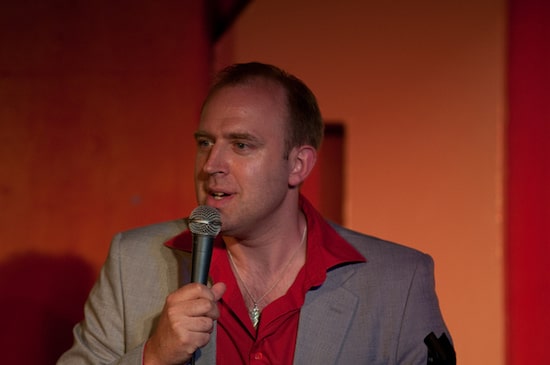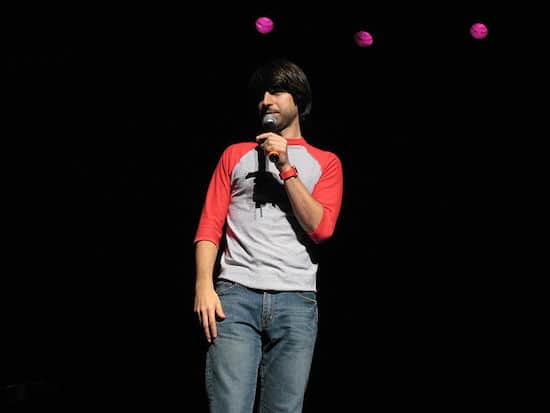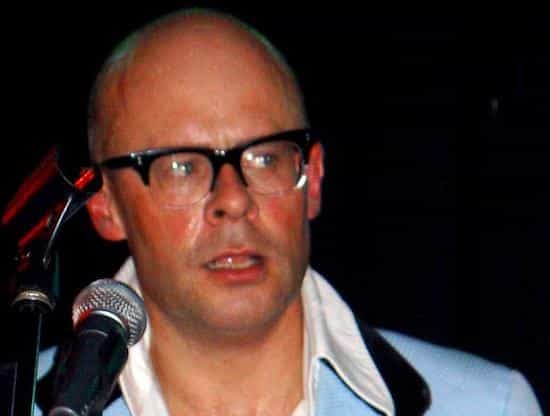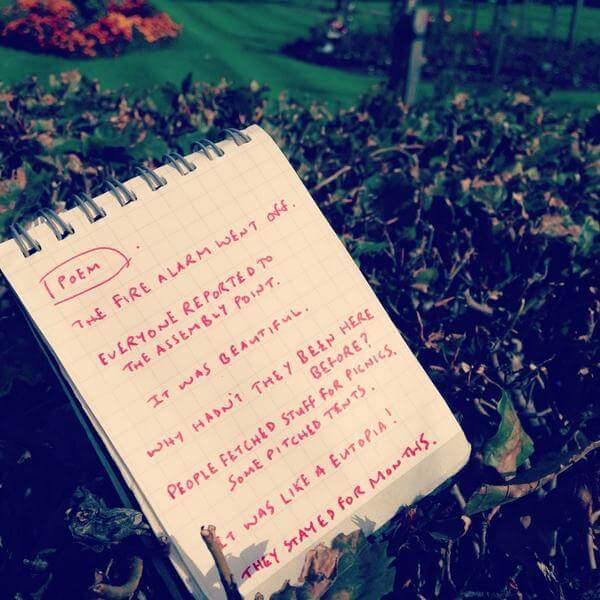How Do Comedians Write Jokes?
Writing a good joke is a genuine art form. The idea that a joke just springs into being, conjured from thin air, couldn’t be further from the truth in most cases. However outwardly simple they may appear, a joke is a complex beast and will have been tweaked and endlessly rewritten, trailed on audiences and refined some more before it is finally ready. In this article, we find out how some of the biggest and brightest talents on the comedy scene go about writing their jokes.
Comedy Secrets Revealed…
Tim Vine

Image by Paul Bailey via Wikimedia Commons
Typical Joke: “I decided to sell my Hoover… Well, it was just collecting dust.”
Tim Vine is the master of the one-liner, having won the ‘Funniest Joke of the Fringe’ accolade twice – no mean feat! In 2014, he won with his above effort on vacuum cleaners.
Vine told the Guardian that he writes 15 new jokes per day on a postcard. What method does he use to generate so many one liners?
In an interview with the Independent, Vine revealed that he often works backwards, writing from punchline to set-up. “I hear punchlines in everyday conversation and think, ‘How could we get there in a different way?’ If someone says, ‘Serves him right,’ I’ll think, ‘Right, OK… A friend of mine’s got a left arm missing. Serves him right.’”
Once perfected on paper, Vine will then test his jokes on an audience until they are at their most potent. “I know it sounds daft, but sometimes you think to yourself, ‘Which way round shall I put it?’” Vine says. “‘I’ve got a friend who’s a tent peg. He’s driven himself into the ground.’ It doesn’t really get much. But you could do, ‘I’ve got a friend who’s driven himself into the ground. He’s a tent peg.’ It may never get beyond a weak laugh and I’ll drop it. Or I’ll tell it and shout, ‘Come on!’ after it.”
Shappi Khorsandi
Typical Joke: ‘What Iran needs now is a more modern leader – a mullah lite.’
Shappi Khorsandi is an Iranian-born British comedian who started out in comedy back in 1997. It wasn’t until her 2006 sell out Edinburgh show Asylum Speaker that things really took off and she established herself as one of the UK’s leading comedians.
In an interview with Beyond the Joke she talked about her writing process: “In stand up, the important stuff goes on before any actual writing happens. I’ll have a strong emotional response to something, an incident, something I’ve seen or heard. If it dances about in my head bothering me, I get on a stage and say it in front of an audience. If I’m relaxed enough, a punchline will eventually arrive. Then I write it down, do it again better, write that down. Each time I tell it, it becomes sharper.”
Khorsandi goes one step further than most comics and actually uses the live environment to discover her jokes, relying on her comic brain to find the punchline. The process of refinement then begins.
Demetri Martin

By Tammy Lo from Brooklyn, NY (Demetri Martin @ Revenge of the Bookeaters) [CC BY 2.0] via Wikimedia Commons
Typical Joke: “The worst time to have a heart attack is during a game of charades.”
Demetri Martin started his joke writing while at work, stealing seconds to play with material: “I would sit there and open a word document and just put like jokes and the date and then start writing. And I think in the very beginning I found pieces of paper in my old notebooks that say, like ‘S’ colon, ‘P’ colon. It was for setup and punch line. So I think I was really trying to get it down to exactly where the joke itself shifts, like what word becomes the punch line. I always liked trying to make things have the fewest words possible. It seems more interesting and kind of more elegant to tell these short ideas.”
An understanding of the basic mechanisms of a joke seems to be part of many comedians development. As well as this, Martin soon realised the need for jokes to be concise, even when working within a larger narrative. “I like to take out as much as possible…My building blocks are little jokes and short ideas. I think that even when I try to write longer things, I still tend to think incrementally, and it almost gets kind of fractal in a sense, where you have the larger structure, and it has a certain arc to it, and then even if you cut the thing in half, you’d have the same structure, and so on.”
When it comes to his stand-up performances, Martin uses a system that allows him to develop and refine his newer material whilst still getting guaranteed laughs. He explained his approach to Fast Co Create:
“I had different columns on these cards I brought with me to do standup. On the far right were the jokes that were brand new—boiled down to a single word or idea. If I’m doing the set correctly, it should all be from that column. The only problem is, a lot of those jokes really suck, and if I stay in that column, I’m gonna bomb and the audience loses confidence in me. One column over, in the middle of the page, those are jokes that work half the time, and I continue to rewrite them onstage. The topic will be something like “revolving door,” and maybe tonight’s the night I figure out how to get it to work. If I do, then I move it to the far left of the page. Those are jokes that I know work something like 90% of the time. The show is kind of a failure if I just stay on the far left of the page, because I already know those work, rather than moving forward. A success would be if I did everything to the right of the page and it worked, then I suddenly have 5-10 minutes to add to my act. Sometimes I just write onstage, though. I’ll have this rambly thing and the audience helps me figure out how to make it work.”
Eddie Izzard
Typical Joke:
The ‘action transvestite’ actor and surrealist stand-up stalwart has been performing since the late eighties, delighting audiences over four decades with his idiosyncratic style.
Although Izzard recognises how difficult joke-writing can be, he finds that being himself makes the process easier. He explained to the Guardian: “In stand-up it really helps to play yourself and talk about your own feelings. You cannot fail to be original if you’re just talking about what you think about X, Y and Z.”
Like many of the comedians featured here, Izzard stumbles upon and hones material in the live environment: “Sometimes I write down notes about what I want to talk about and start trying to flesh them out with the toing and froing of the chitchat, but it’s still tricky. It’s so much easier to find that on stage. Most of it is adlibbed at some point.”
Joe Lycett
Typical Joke: “Went to see the owls at the zoo today, dressed as a mouse. Turned a few heads.”
The Birmingham-born comedian has now established himself as one of the country’s leading comedians following numerous appearances on TV panel shows and several successful pun-based stand-up tours. His Twitter feed is full of hilarious Tweets and is deserving of its huge following.
In an interview with now defunct arts charity Ideas Tap, Joe explained: “My style is quite conversational, so the best stuff usually comes out of me having that conversation – actually talking – out loud. But, that said, a lot of stuff is written on stage, because you go into this weird zone where the panic of having to get a laugh forces something out of you, from somewhere. So it’s a mixture of all things.”
Like Izzard, Joe also believes that a successful show needs honesty: “It doesn’t necessarily mean that all your stories are exactly what happened in a certain scenario, but your opinion must be your own. Don’t just give an opinion that you think the audience want to hear.”
When speaking to comedy.co.uk, Joe revealed how he takes an initial idea and develops it until it is ready to become part of his stand-up set: “I’ll make an observation when I’m out and about; I’ll jot it down on my phone; then I’ll go through those observations and think ‘what scenario might this fit in?’. I draw spider diagrams. That becomes a comic routine possibly, or it doesn’t. Those that do have potential, I try at new material gigs…”
Jerry Seinfeld
Typical Joke: “According to most studies, people’s number one fear is public speaking. Number two is death. Death is number two. Does that sound right? This means to the average person, if you go to a funeral, you’re better off in the casket than doing the eulogy.”
When it comes to observational comedy, Jerry Seinfeld has been leading the way for decades. As the above video highlights, Seinfeld develops his material in a labour-intensive hand-written process – something he’s done since the Seinfeld show on which he worked with Larry David. Rather than ad-libbing on stage, he uses a pen and paper and a longhand method to hone his material. Like many of the best comedians, Seinfeld understands the importance of rhythm in comedy, to the extent that the words must be the right length with the correct number of syllables. He also focusses on finding the “connective tissue” that allows the jokes to fit together and work within a larger set.
Harry Hill

By phil chappell [CC BY-SA 2.0] via Wikimedia Commons
Typical Joke: ‘Gamblers Anonymous: how do they know where to send your winnings?’
Famed for his work ethic (this may have something to do with his former life as a doctor), Harry Hill is a prolific comedy writer and a ‘national treasure’.
In an interview with Comedy UK, he explained his approach to comedy writing: “A lot of the time it’s just sitting down and thinking of ideas. That’s the boring answer. Very rarely do you walk past something in the street and something pops into your head. It’s just an imagination. It’s just the way you’re wired really. The more you do it the more weird you become in that sense.”
On the other hand, he continues: “Stand-up is so immediate. You can have an idea in the morning and get a laugh for it in the evening. No one else can tell you what to do, apart from the audience. The audience is the ultimate arbiter.”
Milton Jones
Typical Joke: “If you’re being chased by a police dog, try not to go through a tunnel, then on to a little seesaw, then jump through a hoop of fire. They’re trained for that!”
Jones deals in one-liners – sharp, surreal, and often silly. Since winning the Perrier Best Newcomer in 1996, he has appeared regularly on radio and TV panel shows as well as touring.
In an interview with Brian Logan for The Guardian, he explained his joke-writing method:
“It’s about turning things upside down. Looking at the things people say and thinking: what’s the opposite of that?”
Jones has a strong visual aspect to his comedy: “If there’s a mindset in my case, it’s that I think in pictures. What I do is put funny cartoons in people’s heads.”
Like many comedians, Jones also exhibits an attention to detail where every word has its role to play: “One word can make all the difference,” explains Jones. “When you eventually get it right, you think: this must exist, surely? There can be a purity about perfect one-liners. It’s as if it’s not from you.”
Tim Key
Typical Joke (Poem):

Having starred in Alan Partridge Mid Morning Matters and Alpha Papa as Sidekick Simon, and enjoyed a stint as resident poet on Charlie Brooker’s Screenwipe, Tim Key is a prolific comic talent whether as performance poet, actor, or writer.
In an interview with Now Then Magazine, Key explained how he creates his poems: “I have quite a disposable writing process. I write poems all the time and then try most of them on stage or on Instagram or somewhere. I have a remarkable tolerance for them, but I know some are better than others.”
Like Demitri Martin, Key also has a system for sorting his stand-up material, having his poems written on cards, laminated pornographic playing cards to be precise. ‘It was a way of easily separating them when trying out material: the poems that were definitely going well I would continue to use, the poems that weren’t I’d put to one side.’ The cards are laminated, to stop them being damaged,” Key told Time Out.
“I tend to just bring together about thirty or forty poems that make me laugh and do a load of work-in-progress nights. Then I try and talk around them a bit and throw in a few anecdotes,” he tells The Skinny
‘Once I have all the bits, I then put it all on a corkboard – into the categories of: poems, talking, ideas that may or may not fit, and films – and then work out how they can fit into a structure that will hold it all.’
How to Write Jokes – In Summary
– Find a writing method that works for you.
– Write as much as possible – not every joke has to be good.
– Pay attention to every word, even syllable, as well as the syntax, grammar, rhythm and even the length of pauses in your joke.
– Test material on a live audience – work-in progress nights are perfect for honing your jokes.
– Allow yourself to pursue tangents, ad-lib, interact with audiences when live on stage – you never know where it might take you and what material you may discover.
– Be honest – write about your own opinions and experiences as much as possible – don’t deliver material that doesn’t feel like you.
– Try and connect your material – work on how each jokes fits with the next and the overall set.
– Be succinct – remove anything superfluous from your joke until you have the bare bones.
– Constantly refine and rewrite your material.
London Comedy Venue for Hire
20 Bedford Way is the ideal comedy venue for hire. Located in the heart of Bloomsbury, we benefit from excellent transport links. Our Logan Hall theatre can seat 910 people, offering excellent sight lines for all and state-of-the-art AV equipment with a AV technician included to make sure your show goes without a hitch. Give us a call today on 020 7612 6143 to arrange a visit or ask any questions.
Find out about our all time favourite London comedy gigs – did we miss any? How about running your own comedy night – our guide has all the information you need.




